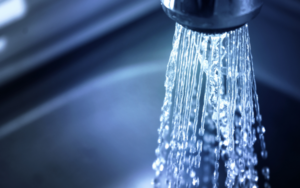With household costs rising it's a good idea to try and cut back on all of your household bills. The average annual combined water and sewage bill in the UK is set to be £473 this year according to industry body Water UK. In this article, we look at how water bills are calculated, how to save on your water bill and what you can do if you're struggling to pay your water bill.
For more money-saving tips and how to save on other bills, read our article 'How to save money on your household bills'. Additional information on cost of living support can also be found in our article, 'A guide to cost of living payments - are you eligible?'
How is your water bill calculated?
How your water bill is calculated varies on whether you have a water meter at your property and this will determine the type of bill that is issued to your household; meaning you will either receive a metered water bill or an unmetered water bill. If you are on a water meter you will be billed for your actual water usage but if you are on an unmetered bill you will be billed on the rateable value of your property. You will also be billed service charges including drainage and highway charges. If you applied for a meter but your water company was unable to fit one you may be billed on an assessed charge which is a rate calculated by the number of bedrooms in your property.
If you have a water meter installed you could save money on your water bill.
When you receive your water bill you may also be billed for sewerage services, but this depends on where you live and your water company. If your water and wastewater services are provided by the same company you will likely have a combined bill. If your water and wastewater services are provided by different companies you may be billed separately for each. If you are unsure which water company you are with you can find your water supplier here.
Is it cheaper to be on a water meter?
If you are being billed on a rateable value at your property you could be paying for more than you are using on your water bills. The below table compares the average water usage for different-sized households which you can use to compare to your current water bill. You can also use the Consumer Council for Water's (CCW) Water Meter Calculator to see if you will be better off on a water meter.
Average water bill cost for combined water and wastewater
| Single occupant | Two occupants | Four occupants | |
| Estimated daily use (litres per day) | 178 | 274 | 438 |
| Estimated annual use (cubic meters) | 65 | 100 | 160 |
| Average annual cost water and wastewater | £291 | £409 | £612 |
| Average annual cost water only | £120 | £174 | £267 |
| Average annual cost wastewater only | £171 | £235 | £345 |
(Data based on Southern Water charges from April 2022 - March 2023. Actual usage may vary between water providers and households)
How to save money on your water bills
We share some helpful tips below to try and save money and water around your home:
- Fix any leaks - Water UK estimates that a dripping tap can waste at least 5,500 litres of water a year so getting a leak fixed quickly can save a large amount of water as well as money on your annual bill.
- Only boil the water you need - Only boiling the water you are going to use each time you make a cup of tea will save both water and energy.
- Wash fruit and vegetables in a bowl - When washing fruit and vegetables wash them in a bowl and rather than tipping the dirty water down the drain you could use it to water plants in your garden or around your home.
- Refrigerate water instead of leaving the tap running - If you often run the tap to get a cold glass of water you could try to instead fill a glass with water and refrigerate it to keep it cool.
- Use a washing up bowl - Using a washing up bowl or putting the plug in your sink when washing up can reduce your water wastage by up to 50% according to Waterwise.
- Use eco settings on appliances - Try to use eco settings on your appliances to save both water and energy.
- Ensure dishwasher/washing machine is full - Maximising the usage of your dishwasher and washing machine can save water rather than running more cycles than you need.
- Shower instead of bath - Try to shower instead of taking a bath to reduce your water usage. Also reducing the time spent in the shower can save you money on your water bills. If you have a power shower head, however, you may consider switching as power showers use an average of 15 litres of water per minute compared to 12 litres with the average shower head.
- Turn tap off when brushing your teeth - Running the tap when brushing your teeth can waste up to 6 litres per minute and if each person in a household does this twice a day that's a lot of water wastage!
- Add a water-saving device to your toilet cistern - A simple way to save money in the bathroom is by adding a water-saving device to your toilet's cistern which enables you to save water every time you flush. Most water companies offer these devices for free and this simple change could save you up to 5,000 litres per year.
- Install a water butt - Installing a water butt in your garden can catch rainwater which can be used to water plants and your garden. You can even attach a hose which can be used when washing a vehicle.
- Use a watering can - Using a watering can instead of a hose can save money and help direct water more easily where you want it to go.
What to do if you’re struggling to afford your water bill
According to the Consumer Council for Water almost 2 million customers may not be receiving the support they are entitled to for their water bills despite a number of schemes and help available to those struggling. In 2023 water companies announced an increase in the support available for their customers, meaning hundreds of thousands more consumers should be able to receive additional support.
If, however, you're finding it difficult to pay your water bill we list below some of the help and support available:
- Contact your water company - If you are unable to pay your water bill the first thing you should do is contact your provider to discuss your situation and attempt to arrange a repayment plan. You should not stop paying your water bill as this could lead to further financial difficulty and negatively harm your credit score which could inhibit you from taking out financial products in the future.
- Check if you're entitled to any discounts on your water bill - You may be entitled to discounts on your water bill if you are a low-income household or receive any benefits. Additionally, if you are a single occupant or have a disability that means you use more water you may also be entitled to a discount on your bill. Contact your water supplier for more information on the support tariffs such as WaterSure.
- Are you eligible for any grants or schemes - Water companies have access to support grants and schemes which can help if you are struggling to pay your water bills and some even have grants that can help to pay any debt that you may owe to your water company. You may also be able to pay your water bill directly from any benefits you receive such as Income Support or Pension Credit. Get in touch with your water supplier to see if you qualify for any of the assistance schemes.





